When it became apparent that Chinese Nationalist Party (KMT) Hsinchu mayoral candidate Hsu Ming-tsai (許明財) was going to lose the election, he did the only thing any self-respecting politician would do: head to the temple, sit in front of an alter, pray to a deity and cry, all while having his hair shaved off.
Flanked by supporters at Hsinchu’s Du Cheng Huang Temple (都城隍廟), former Hsinchu mayors Shih Hsin-chung (施性忠) and Tung Sheng-nan (童勝男), and academic Jou Jwo-huei (周卓煇) each took turns using an electric razor to remove Hsu’s hair, a gesture that was meant to symbolize the candidate’s determination to get elected, stamp out black-gold politics and bring happiness and prosperity to his constituents.
Aside from sobbing, Hsu didn’t make a sound throughout the trim.
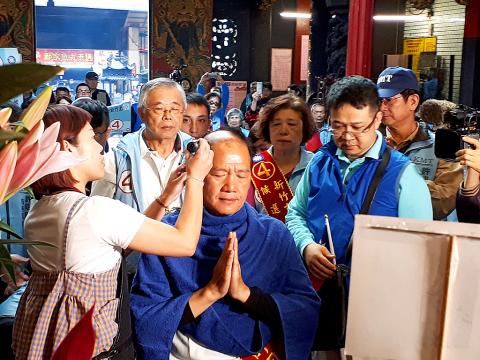
Photo: Hong Mei-hsiu, Taipei Times
Crying, praying or having one’s hair cut as a means of appealing for votes is a Taiwanese tradition dating back to the Martial Law era, when non-KMT politicians had to appeal to voters in extraordinary ways. Known as suzhubeiqing (訴諸悲情, literally: appealing to sadness), candidates — political heavyweights in tow — use this kind of behavior to show their sincerity and create an obligation in the minds and hearts of decided and undecided voters, who are made to feel guilty if they don’t vote in a particular way.
The gesture, however, smells of desperation. It is more likely that those candidates heading for defeat will blub in public.
Perhaps the most famous politician to use suzhubeiqing is former Democratic Progressive Party (DPP) legislator Chu Hsin-yu (朱星羽). Chu’s main tactic was to show up at funerals, prostrate himself at the entrance of the hall where the body was kept and proceed to crawl toward the casket, wailing over the memory of the deceased.
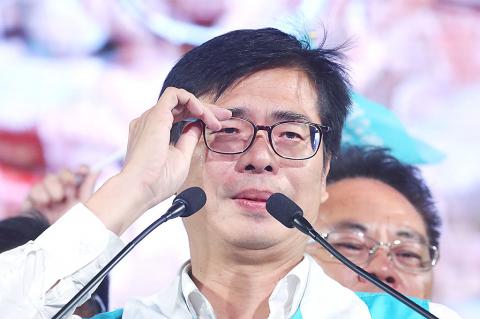
Photo: CNA
But Hsu’s suzhubeiqing trifecta is rare, with candidates typically appealing to only one of these behaviors.
CRYING OUT FOR VOTES
Crying on the campaign trail is de rigueur for many politicians. At a rally last Friday, Kaohsuing mayoral candidate Chen Chi-mai (陳其邁) took to the stage and cried in front of 200,000 supporters, as did Lee Chia-fen (李佳芬) — the wife of Han Kuo-yu (韓國瑜), the KMT’s candidate — in front of 150,000 supporters.
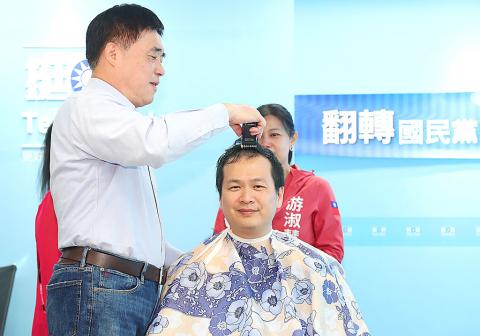
Photo: CNA
Taipei mayor Ko Wen-je (柯文哲) and DPP Taipei mayoral candidate Pasuya Yao (姚文智) choked up many times on the campaign trail as did New Taipei City mayoral candidate Hou You-yi (侯友宜).
In every case, the candidates talk about some wrong that has been committed against them and how they will survive the onslaught.
When asked by reporters why he had a tendency to blub, Ko said that it was the only way for him to handle all the political attacks against him. Others, such as Chen, said that it is all his supporters that lead him to cry.
VOWING TO THE GOD TO DO GOOD
The rough and tumble of political campaigns often lead politicians to make vows, as when DPP Taipei city councilor Wang Shih-cheng (王世堅) vowed to jump in the sea if Han was elected Kaohsiung mayor — a promise he had also made and fulfilled in 2008 when he told the media if the KMT won all eight of Taipei City’s legislative districts. As of press time, Wang had yet to take the dive.
Another common vow is one given to a deity, which consists of leading the media to a temple, making a promise and stating what the consequences will be if the promise is not kept.
In Tainan, mayoral candidate and former KMT, legislator Kao Su-po (高思博) vowed to never use the power of his office to obtain illegal or private gains for his family or take kickbacks. Flanked by former New Taipei City mayor Eric Chu (朱立倫), Kao said that if he breaks his vow he is willing to undergo the most severe punishment.
(Incidentally, the question has to be asked as to why Kao needed to make this promise in the first place.)
But many people thought that Kao’s vow was insincere because he didn’t specify what his punishment would be.
One candidate who did specify what his punishment should be is Shen Chen-hsun (沈暉勛), a candidate for mayor of Dounan Township (斗南) in Yunlin County. Shen’s vow at a Mazu temple came in response to accusations of bribery and vote buying, a “rumor,” Shen said, that wreaked havoc on his campaign.
He promised to pay NT$1 million to anyone that caught him breaking his vow.
SHAVE THAT HAIR
When 277 bald men appeared at a rally for Kaohsiung mayoral candidate Han Kuo-yu, they were referencing his own baldness and nodding to a tradition that dates back decades: shaving a candidate bald shows their honesty, integrity and sincerity because it is an act that no regular person would think of doing and it’s associated with monks and nuns.
Indeed, Han’s baldness became an important part of his campaign, as though it meant that he was intrinsically honest, the kind of stuff his fellow KMT members to the north were hoping would rub off.
“Feels pretty spicy,” said former Presidential Office deputy secretary-general and Taipei city councilor candidate Lo Chih-chiang (羅智強) last Wednesday at a press conference after KMT Vice Chairman Hau Lung-bin (郝龍斌) removed some of his hair.
Lo said he was imitating what he called Han’s 500 “bald warriors” (光頭戰士), adding that he wanted to be part of those fighting on behalf of the KMT.
So does employing suzhubeiqing on the campaign trail work? Probably not as increasingly most voters see this kind of politicking as a stunt that shows that the candidate is heading toward defeat.
In any event, Hsu lost out to incumbent mayor Lin, and Chen in Kaohsiung lost to Han, who intentionally ran a campaign that avoided as much as possible these kinds of appeals. Ko remains Taipei mayor and Kao lost out to Huang Wei-che (黃偉哲), the DPP candidate for Tainan mayor. Lo took the highest number of votes in his district, and Shen’s vow that he didn’t buy votes or commit bribery seems to have worked, as he won with 30 percent of the vote.
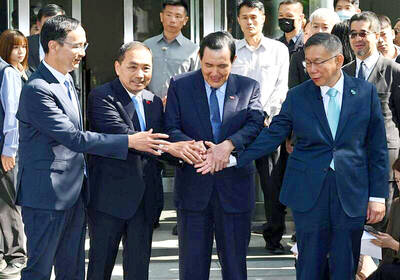
Has the Taiwan People’s Party (TPP) changed under the leadership of Huang Kuo-chang (黃國昌)? In tone and messaging, it obviously has, but this is largely driven by events over the past year. How much is surface noise, and how much is substance? How differently party founder Ko Wen-je (柯文哲) would have handled these events is impossible to determine because the biggest event was Ko’s own arrest on multiple corruption charges and being jailed incommunicado. To understand the similarities and differences that may be evolving in the Huang era, we must first understand Ko’s TPP. ELECTORAL STRATEGY The party’s strategy under Ko was
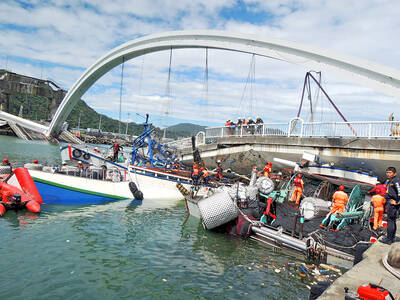
Before the recall election drowned out other news, CNN last month became the latest in a long line of media organs to report on abuses of migrant workers in Taiwan’s fishing fleet. After a brief flare of interest, the news media moved on. The migrant worker issues, however, did not. CNN’s stinging title, “Taiwan is held up as a bastion of liberal values. But migrant workers report abuse, injury and death in its fishing industry,” was widely quoted, including by the Fisheries Agency in its response. It obviously hurt. The Fisheries Agency was not slow to convey a classic government
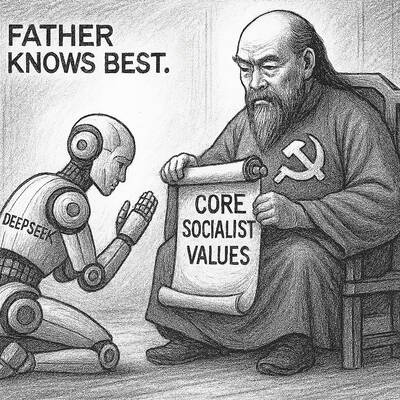
It’s Aug. 8, Father’s Day in Taiwan. I asked a Chinese chatbot a simple question: “How is Father’s Day celebrated in Taiwan and China?” The answer was as ideological as it was unexpected. The AI said Taiwan is “a region” (地區) and “a province of China” (中國的省份). It then adopted the collective pronoun “we” to praise the holiday in the voice of the “Chinese government,” saying Father’s Day aligns with “core socialist values” of the “Chinese nation.” The chatbot was DeepSeek, the fastest growing app ever to reach 100 million users (in seven days!) and one of the world’s most advanced and
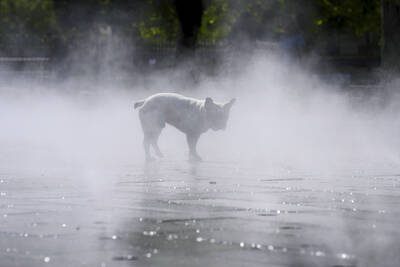
It turns out many Americans aren’t great at identifying which personal decisions contribute most to climate change. A study recently published by the National Academy of Sciences found that when asked to rank actions, such as swapping a car that uses gasoline for an electric one, carpooling or reducing food waste, participants weren’t very accurate when assessing how much those actions contributed to climate change, which is caused mostly by the release of greenhouse gases that happen when fuels like gasoline, oil and coal are burned. “People over-assign impact to actually pretty low-impact actions such as recycling, and underestimate the actual carbon